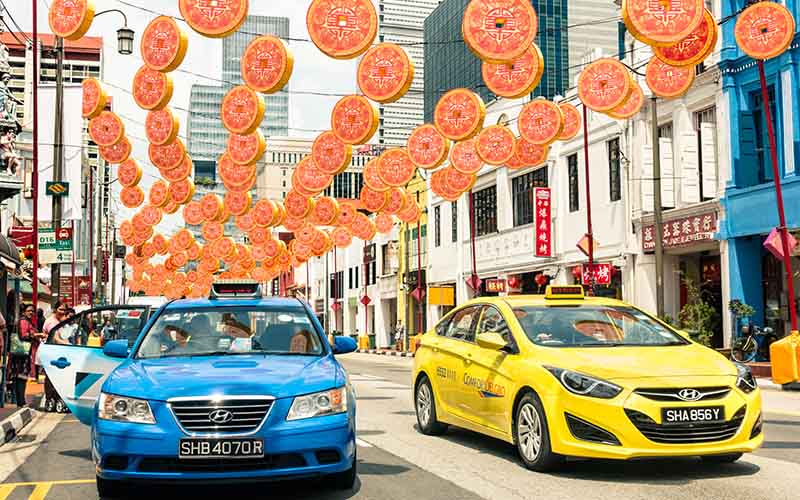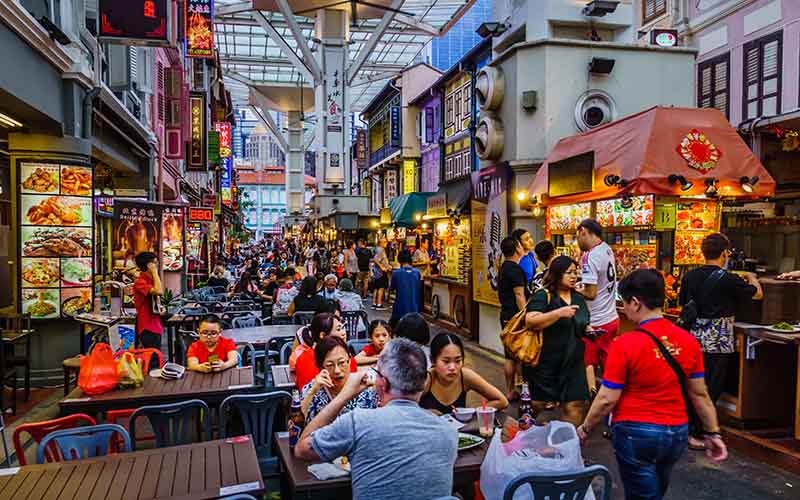With its multicultural and vibrant nature, Singapore is one of the best places to live in Asia. The city,
which is also a country itself, attracts several tourists throughout the year. While visiting this place can
be highly exciting, it can also be an unnerving experience for a visitor due to many customs and laws
that constitute Singaporean culture.
If you are planning to visit Singapore for the first time, having a good understanding of the customs and laws followed in Singapore is a must.
Here are The Top 13 Things that you should know about Singapore culture.
1. Singaporeans excel in speaking their version of English (Singlish)
You might not have seen Singapore on the list of the top English speaking countries in the world. But did you know that a major part of the country’s population can speak fluent English? They do it in their way and call it Singlish.
Singaporeans receive education in English, which explains the reason for their excellent and fluent command of the language. Due to the culture of speaking English, Singapore draws the attention of a considerable number of tourists from English-speaking nations each year.
2. Singapore boasts a well-regulated and metered taxi system

In most nations in Asia, foreign tourists face commuting issues due to exorbitant taxi fares. Singapore is an exception in this regard due to its well-regulated and metered taxi system. Due to the latter, tourists get to know about the precise fares of travelling to different places in Singapore on a taxi. For a fair calculation, distances are measured using meters.
Boarding a taxi in Singapore is also simple and easy due to the availability of popular taxi services like Uber and Grab. No matter wherever you are in Singapore, you can board a taxi with ease with the help of these services.
3. Use packets of tissues to reserve your seat at a hawker centre

Singapore has several hawker centers wherein you can have a meal. When you go to a hawker centre, sometimes you may notice scattered packets of tissues on tables. Also, you may see umbrellas on them instead of tissues. These items on a table at a hawker centre indicate that it is already reserved. You can also try the same to book a table.
Interestingly, this practice of indicating a reserved table is still followed in the country and constitutes a principal element of Singaporean culture.
4. Tipping is not mandatory at cafes and restaurants in Singapore
Tipping may be a mandatory practise in many western countries, but it is not necessary when you are in Singapore. The majority of cafes and restaurants in the country include a service charge in the invoice. As such, you, as a tourist, are not obliged to give a tip at the time of leaving a cafe or restaurant.
While tipping may not be mandatory in Singapore, it isn’t illegal either. You can make a decide on this matter at your discretion.
5. Stand on the left side when going up an escalator
Standing in a queue on the left side while going up an escalator is considered orderly behavior in Singapore. While you may frown at it if you see it for the first time, Singaporeans consider it an act of courtesy.
6. A robust and aromatic cup of coffee goes by different names in Singapore
If you are a coffee lover, you will find Singapore to be a heaven of robust and aromatic coffee. You would not need to travel long distances for it on your trip to Singapore as almost every locality in the country houses a coffee shop.
Upon visiting a coffee shop in Singapore, you may come across coffee with different names such as Kopi Siew-dai, Kopi Gao, Kopi-C, and more. Do not get nervous with so many names, though, as they only indicate coffee with different aromas or flavors.
7. Singaporeans believe in partying hard
When at work, Singaporeans leave no stone unturned to give it their best shot. As much hard effort they put in at work, they also party hard to experience the peak level of enjoyment. The common venue for partying in Singapore is either a central hub or a bar. For this reason, Singapore is also one of the best places for nightlife.
8. Littering carries a fine, so be careful to use dustbins
Singapore may be a crowded city with a humid environment. Still, it sits on one of the top spots on the list of clean and hygienic cities across the globe. Throwing napkins and packets anywhere other than dustbins is strictly prohibited in the country. Offenders can be either fined or asked to participate in a community sweeping program.
9. Buying drinks or alcohol is not permissible in a public place after 10.30 pm
This rule was not in place until 2012. But things changed after an infamous riot in the city in 2013. Following it, authorities decided to impose a ban on the purchase of alcohol and other such drinks between 10.30 pm and 7 am. When applying for a Singapore tourist visa, you must know about this rule to avoid being fined or getting entangled in a legal issue.
10. You can smoke only in designated areas
Though smoking is not illegal, you will need to follow some strict regulations in Singapore if you are a smoker. For smoking, you can head to one of the designated points in Singapore. Smoking in Sheltered walkways, public bus stops, or even indoors carries a fine of $1,000.
11. Trying Singaporean cuisine
Singapore’s cuisine reflects its multicultural diversity, integrating Chinese, Malay, Indian, and Western influences. Some signature Singaporean dishes include Hainanese chicken rice, laksa (a spicy noodle soup), chili crab, and roti prata. Given Singapore’s location and history as a port city, its cuisine blends the best of different food traditions.
Whether you’re looking for street food hawker fare or high-end restaurant meals, Singapore’s vibrant food scene has something to satisfy all tastes and budgets.
12. Enjoying unique Singaporean music
Singapore has a thriving contemporary music scene rooted in its cultural blend. Traditional Chinese, Malay, and Indian music still play a role, while Western pop, rock, hip-hop and electronic dance music genres are also popular, especially among younger listeners.
Homegrown Singaporean talent produces songs in English, Mandarin, Malay, Tamil, and other languages. The Esplanade concert hall regularly hosts orchestral and opera performances, while live music clubs feature both local bands and international acts. From the sultan-inspired songs of singers like Ramli Sarip to the indie pop stylings of bands like The Sam Willows, Singapore’s music reflects both global and local influences.
13. Attending the festivals in Singapore
Many colorful cultural and religious festivals take place annually in Singapore. These include Chinese New Year, the Hindu festival of lights known as Deepavali, the Muslim celebration of Hari Raya Puasa which marks the end of Ramadan, the mid-autumn Lantern Festival celebrated across Chinese communities, and Christmas.
Many of these festivals feature delicious seasonal dishes and sweet treats, new clothes, family reunions, street bazaars and performances, fireworks, and house decorating contests. It’s easy to get caught up in the festive spirit, no matter your background. The diversity of celebrations is a reminder of Singaporeans’ openness to each other’s traditions.
Frequently Asked Questions
What are some must-try Singaporean dishes?
Singapore is a true foodie’s paradise, with a variety of delicious dishes to sample. Some quintessential Singaporean foods to try including Hainanese chicken rice (poached chicken served with fragrant rice cooked in chicken stock), laksa (spicy coconut milk-based noodle soup), chili crab (a whole crab topped with a tangy, spicy tomato and chili sauce), satay (grilled meat skewers with peanut dipping sauce), and nasi lemak (coconut rice served with anchovies, egg, peanuts, and spicy sambal).
The many hawker centers around Singapore offer fantastic budget-friendly meals showcasing Chinese, Malay, and Indian specialties.
What languages are most widely spoken in Singapore?
While English is Singapore’s first language and the language of business, most Singaporeans also speak Mandarin Chinese and to a lesser extent Malay and Tamil. Many Singaporeans communicate using Singlish in informal contexts – a local patois mixing English with Chinese, Malay, and Indian slang, and grammar constructions. Visitors can get by easily just using English, though learning a few phrases in these other languages can provide glimpses into Singaporean culture.
What traditional festivals are celebrated in Singapore?
Singapore celebrates festivals originating from its Chinese, Malay, Indian, and Western influences. These include Chinese New Year, Hari Raya Puasa (Eid al-Fitr), Deepavali, Thaipusam, Mid-Autumn Festival, Vesak Day, and Christmas. The national “Racial Harmony Day” on July 21 also commemorates Singapore’s cultural diversity. These festivals feature unique foods, performances, rituals, and decorations – vibrant ways to experience Singapore’s dynamic mix of cultures.
Where can visitors experience Singaporean culture through arts performances?
Key venues to experience local theatre, music, and dance include the Esplanade – theatres on the Bay which hosts concerts and operas, the Singapore Chinese Orchestra’s concerts at the Singapore Conference Hall, Indian classical arts performances at the Indian Heritage Centre, and Malay arts staged at Sri Warisan Som Said Performing Arts Ltd. Cultural festivals like Singapore HeritageFest, Kalaa Utsavam festival, and the Singapore Night Festival also showcase traditional and contemporary multi-disciplinary arts celebrating Singaporean culture.
What are Singaporean attitudes and norms around culture that visitors should know?
Singapore prides itself on sustaining racial and religious harmony despite its diversity. Most Singaporeans respect cultural differences and avoid sensitive topics that could offend others. There are strict rules around hate speech. Singapore also upholds cleanliness and orderliness standards, with laws against littering, jaywalking, and more.
Drug trafficking offenses also receive harsh punishments. Generally, Singaporeans value etiquette, education, efficiency, safety, and stability in society and expect visitors to adhere to social rules for smooth interactions. Understanding these norms and Singapore’s complex cultural landscape will enrich any visit.
Conclusion
Whether you are planning to visit Singapore for the first time or you have already been to the city, bearing the above cultural aspects of Singapore in mind will make your visit to the city both enjoyable and memorable. Now that you know about the things that you can or cannot do in Singapore, it is just about the right time to apply for a Singapore visa if you do not already have one.
